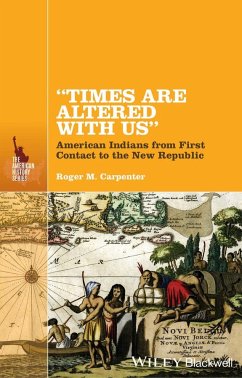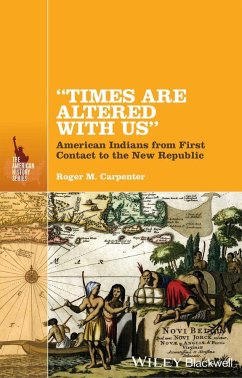
Apache-US Relations During the Apache Wars. A Study of the Imperialistic Role of the BIA
Versandkostenfrei!
Versandfertig in 1-2 Wochen
15,95 €
inkl. MwSt.

PAYBACK Punkte
0 °P sammeln!
Seminar paper from the year 2014 in the subject History - America, Georgetown University, course: History of the Federal Government, language: English, abstract: Perhaps one of the least well-known and least understood of the United States government agencies is the Bureau of Indian Affairs (BIA). On the other hand, one of the most well-known yet most misunderstood of the American Indian tribes are the various bands and peoples that comprise the Apache Indians. The reason for the Apaches' prominence in the American psyche is due to the violent and tragic period in American history known as the...
Seminar paper from the year 2014 in the subject History - America, Georgetown University, course: History of the Federal Government, language: English, abstract: Perhaps one of the least well-known and least understood of the United States government agencies is the Bureau of Indian Affairs (BIA). On the other hand, one of the most well-known yet most misunderstood of the American Indian tribes are the various bands and peoples that comprise the Apache Indians. The reason for the Apaches' prominence in the American psyche is due to the violent and tragic period in American history known as the Apache Wars of the late nineteenth and early twentieth centuries. This paper examines the relationship between the Apache Indians and the BIA during the Apache Wars, looking to see what were the circumstances surrounding this tenuous relationship, the causes and effects of the government's Indian policy, and the influence, actions, and attitude of the BIA during this period. In this pursuit, I examined both primary sources, mostly comprising of governmental records and newspaper articles, and historians writings on the issue from a range of years. The primary sources serve to show the change and continuity in the government's Indian policy and public opinion concerning the Apaches before, during, and after the Apache Wars. The secondary historical accounts of the issue serve to also show change and continuity, but rather they show it in terms of how the perception of the Apache Wars and the BIA's role in it have changed over time and which aspects of the history have been discarded and which remain. This paper concludes that the government's Indian policy was couched in the language and ideology of Manifest Destiny and internal colonialism and the actions of the BIA were a reflection of this. Although it can by no means be said that the BIA's methods were entirely uniform throughout the Apache Wars, whatever the justification they all contained language of internal colonialism and betrayed various degrees of prejudice and the belief that the Apaches, and all Indians for that matter, were lesser than Whites and needed to be ruled for the sake of all parties involved.












